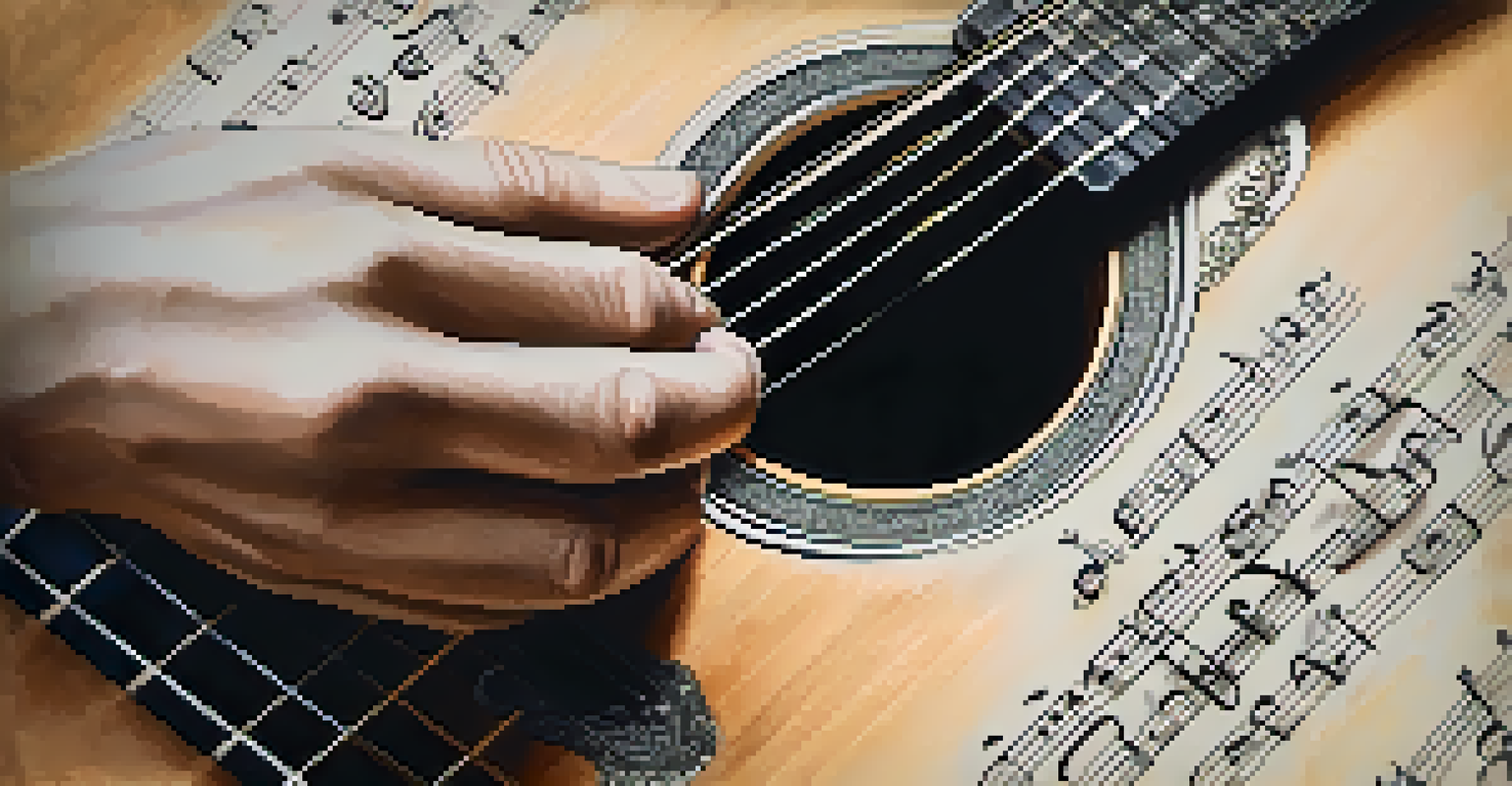Lyric Writing with Guitar: Harmonizing Words and Music

Understanding the Basics of Lyric Writing
Lyric writing is the art of crafting words that resonate with listeners. It’s about finding the right emotions to convey and the perfect phrases to express them. Much like painting, lyrics can evoke feelings, tell stories, and create images in the mind of the listener.
Lyrics are the poetry of the heart, where emotion and melody come together to tell a story.
To start, think about the theme of your song. Are you writing about love, heartbreak, or perhaps a personal journey? Narrowing down your focus helps create a cohesive narrative. For example, if you're writing a love song, consider your own experiences or those of people around you to inspire authenticity.
Related Resource
Remember, lyrics should have a rhythm that complements the music. This means considering syllables and stress patterns as you write. A good exercise is to sing your lyrics out loud to ensure they flow well with your melody.
Finding Your Unique Voice in Lyrics
Every songwriter has a unique voice, and discovering yours is crucial. This means embracing your style and experiences to create something original. Whether you write confessional, poetic, or narrative lyrics, authenticity will shine through in your work.

To cultivate your voice, try free writing or journaling. Set a timer and write whatever comes to mind about your chosen theme without worrying about structure or rhymes. This process can reveal your natural language and style, which can then be refined into lyrics.
Crafting Authentic and Unique Lyrics
Embrace your personal experiences and style to create lyrics that resonate with authenticity and originality.
Additionally, listen to your favorite artists and analyze their lyricism. What stands out to you? How do they express emotions? Learning from others can inspire your own unique voice while ensuring you don’t mimic their style.
The Role of Guitar in Lyric Composition
The guitar acts as both an instrument and a collaborator in lyric writing. It provides a melodic foundation that can influence the mood and direction of your lyrics. Whether strumming chords or fingerpicking, the sound of your guitar can spark ideas and emotions.
Songwriting is about finding your voice and telling your story in a way that resonates with others.
Experimenting with different chord progressions is a great way to find the right feel for your song. For instance, a simple G-C-D progression might evoke a happy vibe, while minor chords can add a touch of melancholy. Let the music guide your words, creating a symbiotic relationship between lyrics and melody.
Related Resource
Don’t be afraid to adjust your lyrics based on the music. Sometimes, a line might not fit perfectly, and that’s okay! Flexibility is key – allow your lyrics and guitar parts to evolve together, enhancing the overall song.
Crafting Compelling Hooks and Themes
A compelling hook is what makes a song memorable. It’s often the catchiest part that listeners will remember long after they've heard it. Think of it as the heart of your song, encapsulating the main idea in a way that resonates with your audience.
When crafting hooks, focus on clarity and brevity. A strong, simple phrase can have a greater impact than a complex one filled with abstract ideas. For example, the phrase 'I can't help falling in love' from Elvis Presley’s classic is straightforward yet powerful, capturing the essence of the song beautifully.
The Importance of Hooks in Songs
A strong, memorable hook captures the essence of your song and connects with listeners on a deeper level.
In addition to hooks, ensure that your themes are relatable. Writing about universal experiences like love, loss, and self-discovery can create a bridge between you and your listeners, making your music resonate on a deeper level.
Using Imagery and Metaphors in Lyrics
Imagery and metaphors are powerful tools in lyric writing. They create vivid pictures in the minds of listeners, allowing them to connect emotionally with your song. Instead of stating facts, paint a picture using descriptive language that evokes feelings.
For example, instead of saying 'I miss you,' you might write 'The stars shine brighter when you’re far away.' This metaphor not only expresses longing but also creates an image that listeners can visualize and relate to.
Related Resource
When using imagery, consider incorporating sensory details – what do your characters see, hear, or feel? This added depth can transform your lyrics from simple statements into captivating stories that resonate deeply with your audience.
Editing and Refining Your Lyrics
Editing is an essential part of lyric writing. Once you’ve poured out your thoughts and ideas, it’s time to refine them into a polished piece. This process involves reviewing your lyrics for clarity, flow, and emotional impact.
Take a break after your initial writing session and revisit your lyrics with fresh eyes. Look for any lines that feel awkward or out of place. Don't hesitate to cut or rewrite sections that don’t serve the overall message of your song.
Editing for Clarity and Impact
Refining your lyrics through editing enhances clarity and emotional impact, ensuring your message is effectively conveyed.
Additionally, consider sharing your lyrics with trusted friends or fellow musicians for feedback. They can provide valuable insights and suggestions that may enhance your writing and offer perspectives you might not have considered.
Bringing It All Together: Final Thoughts
Lyric writing is a beautiful blend of art and emotion, and when combined with guitar, it creates a powerful form of expression. Remember that there’s no right or wrong way to write lyrics; it’s about finding what resonates with you and your audience.
As you continue to practice and hone your skills, allow yourself the freedom to experiment and explore different styles. Each song you write contributes to your growth as a songwriter, so embrace the journey.

Ultimately, the goal is to create music that speaks to the heart. Whether your lyrics tell a story, evoke emotions, or simply entertain, the harmony of words and music can leave a lasting impact on your listeners.